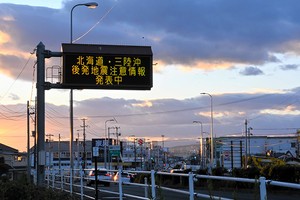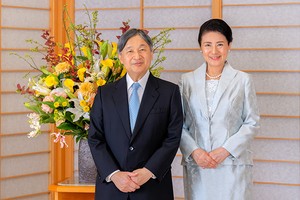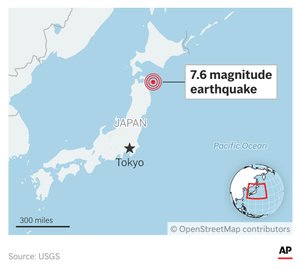January 20, 2024 at 17:57 JST
 Junior high school students from Wajima, Ishikawa Prefecture, arrive at an educational facility in Hakusan in the prefecture on Jan. 17 following their evacuation because of the earthquake on New Year’s Day. (Pool)
Junior high school students from Wajima, Ishikawa Prefecture, arrive at an educational facility in Hakusan in the prefecture on Jan. 17 following their evacuation because of the earthquake on New Year’s Day. (Pool)
The Jan. 1 Noto Peninsula earthquake resulted in the mass evacuation of junior high school students from the hard-hit city of Wajima in Ishikawa Prefecture. In total, 258 students left their families behind.
The magnitude-7.6 temblor damaged schools and rendered many students homeless, leaving them with no prospect of being able to resume classes. About 140 junior high school students from the city of Suzu and the town of Noto are expected to follow.
Authorities decided the students could cope with being away from their parents for two months because they had already experienced school excursions and other events. Even so, the local authorities concerned will need to make special efforts to attend to the students’ mental well-being.
The same goes for the students who are staying behind in the affected local communities to ensure they have adequate learning opportunities. This will require flexible responses for those who wish to return home or, conversely, want to evacuate.
The students who evacuated will be mostly free from concerns about aftershocks and issues concerning water or electricity supplies. Twenty-five teachers are also accompanying the students. Many parents, knowing their children are learning in a safe environment, will be able to focus on reconstruction with peace of mind.
However, the stress of living in shared rooms is bound to have an effect. Some students may feel guilty about having been evacuated while their families are grappling with hardships back home. Many third-year students are facing high school entrance exams.
Teachers and other adults need to pay close attention to each student. In doing so, they should strive to provide opportunities for refreshment, such as arranging meetings with parents and staging extracurricular activities.
When the volcano on Miyakejima island erupted in 2000, about 350 elementary, junior and senior high school students evacuated. A teacher involved in the collective student relocation later recalled that students began to feel stressed as the situation dragged on.
Teachers are also facing a significant burden, which will call for meticulous and tailored support in the days ahead, say experts. No doubt, some of those accompanying the students left homes that were damaged in the disaster. School counselors and others responsible for the mental health of teachers should also pay attention to such matters.
The situation facing students left behind to cope with post-disaster challenges is also a concern. In Wajima, the municipal authorities vowed to look at each student’s situation to assess how to support them, but specific plans have yet to be mapped out. Efforts must continue to ensure safety and provide an environment where every student can learn without falling behind.
Once the communication environment is restored, the local governments should also create opportunities for online classes with evacuated classmates.
The prefecture and surrounding municipalities should support the two cities, as well as the town undertaking the group student evacuations, by dispatching teachers, experienced individuals and aid staff. Utilizing online materials and know-how of learning support from nonprofit organizations is also an option that should be seriously considered in providing a learning environment suited to the individual students’ needs.
On the other hand, group evacuation could potentially be an opportunity for students to develop various skills and capabilities. For example, students could think about rules to make their lives as evacuees comfortable and rewarding.
Discussing the creation of such rules with peers and adjusting them as necessary could prove to be an experience that builds confidence in students to participate in society in the future.
--The Asahi Shimbun, Jan. 20




















A peek through the music industry’s curtain at the producers who harnessed social media to help their idols go global.
A series based on diplomatic documents declassified by Japan’s Foreign Ministry
Here is a collection of first-hand accounts by “hibakusha” atomic bomb survivors.
Cooking experts, chefs and others involved in the field of food introduce their special recipes intertwined with their paths in life.
A series about Japanese-Americans and their memories of World War II